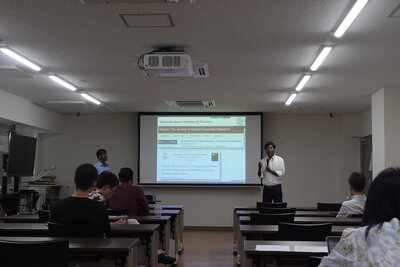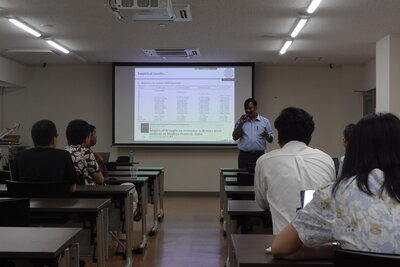Lecture by Assoc. Prof. Subir Sen - An Assessment of Economic Impact due to Disasters: The case of India
During his visit to the Disaster Prevention Research Institute (DPRI), Kyoto University, Uji Campus, Kyoto, Japan, Dr. Subit Sen, Associate Professor,Department of Humanities and Social Sciences, Indian Institute of Technology Roorkee, Roorkee, India, delivered a lecture to the students and faculty of DPRI on 3 August 2023.
Abstract:
India remains highly vulnerable to extreme events occurring at repeated intervals such as floods, cyclones, and droughts. According to the latest estimates of the United Nations Office for Disaster Risk Reduction (UNDRR), about 300 disaster events are reported in the country over the past two decades which led to an estimated USD 79.5 billion direct economic losses, approximately 76,000 deaths and over 1 billion people affected including those who were left homeless following
the disaster. Notably, natural hazard-induced disasters may be of two categories based on the specific characteristics they demonstrate. First, are the fast onset disasters like floods, cyclones, earthquakes that occur rapidly, after-effects stay for a relatively short period, impact a particular location or geography and leads to property damages and loss of human lives and livelihood. The onset and end time of such disaster events are quick and measurable in general. The slow onset disasters, on the other hand, are events like droughts. The characteristics, causes, nature and the ability drought events to harm the individuals along with the impact on economic growth remains complex issues in comparison to the fast onset disasters. Droughts often have no particular time of arrival or ending and may spread over a small or a large geographic area.
Though, droughts do not cause any direct property damages, but can adversely affect the individuals, community and the overall economic growth of the affected region. Therefore, most of the times, it becomes difficult to identify their severity and the loss and damages they cause. Contrary to the general belief, there are empirical evidences to suggest that slow onset disasters (like droughts) may severely damage an economy than the fast onset disasters. Another difference between the fast and slow onset disasters is the sectors which are adversely affected. For example, droughts impair the agricultural sector of the economy, although it has indirect impact on the secondary and tertiary sectors due to the inter-linkages between these sectors. On the contrary, the fast onset events can adversely affect not only the agricultural sector but also the manufacturing and service sectors. With more visible destruction, intensity as well as the public and media attention, the government and policy-makers remain more concerned towards the fast onset events than the slow onset disasters. Interestingly, the existing disaster management policies in India treats both these types alike raising a serious concern towards the disaster management approach and practices. Although different ministries manage different disasters, the policy (in form of Disaster Management Act, 2005 and National Disaster Management Plan, 2016) guiding them remains the same.
Given the different mode and impacts of natural disasters on the economy and its sub-sectors, it would be interesting to analyse the fast and slow onset disasters impact separately along with overall impact of natural disasters. The present study attempts to analyse the relationship between natural disasters and economic growth for a sample of selected 25 Indian states. Using augmented panel vector autoregression (PVARX), the dynamic responses of the economic indicators (e.g. state GDP) to disaster shocks would be generated to identify the disaster impact not only in the year of the event but also in following years. The fast onset disasters are represented by flood events while droughts would proxy for the slow onset disasters. In case of fast onset disasters (floods), yearly as well as 5 years cumulative impact would be estimated and for the slow onset disasters (droughts) 3 years average impact would be estimated. The outcome of the analysis may prove to be helpful for the policy makers in both central and the state governments to formulate the appropriate disaster management policies for the respective disaster types.
Keywords: Natural Disasters, Economic Impact, Panel Data Analysis, Disaster Risk
Reduction, India.
Brief Biography:
Subir Sen is Associate Professor in the Department of Humanities and Social Sciences and Joint Faculty in the Centre of Excellence in Disaster Mitigation and Management (COEDMM) at the Indian Institute of Technology Roorkee. He obtained is PhD in Economics from the Institute for Social and Economic Change, Bangalore with fellowship under the "Reserve Bank Scheme of Endowment of Professorial Chairs and Research Fellowship". His research areas are Economics of risk and uncertainty, Insurance economies, and Economics of climate change and natural disasters. In recent years, he has grown interest in the field of sustainability and the concept of circulating and ecological sphere. He worked at TERI University, New Delhi and Madras School of Economics, Chennai before joining IIT Roorkee. He received distinguished awards such as JSPS-ICSSR Joint Research Project, First Prize under Japanese Outstanding Research on Development (ORD) from Global Development Network (GDN) in 2015, subsidy for PhD. thesis from the Association Internationale pour I'Etude de I'Economie de I' Assurance (the Geneva Association) and scholarship for participation in Lindau Nobel Laureate Meeting 2008, to mention a few. He contributed to sponsored research by the Govt. and International agencies like Ministry of Agriculture, Govt. of India, IRDAI, SANEI, APN, DST-CHORD, IFC, World Bank Group and UK NERC. He presented his research in different national and international conferences and has few publications to his credit. He served as a Member of the Board of Governors, Asia Pacific Risk and Insurance Association (APRIA) for the period 2019-2022 and is currently Secretary of the Indian Society for Ecological Economics (INSEE). His research has appeared in journals such as Natural Disasters, Climate and Development, International Journal of Disaster Risk Reduction, Economics of Disasters and Climate Change, among others.








